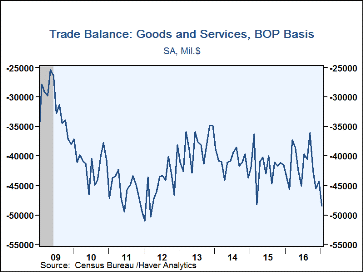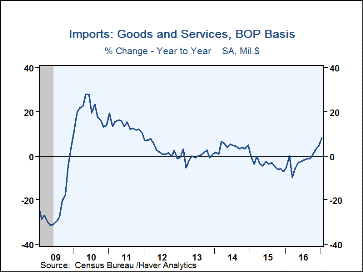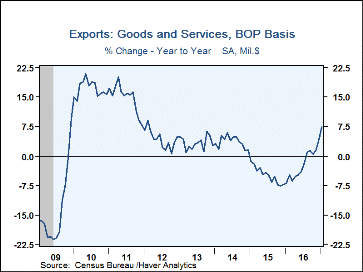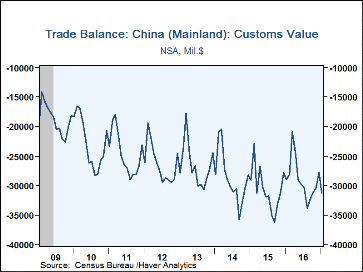 Global| Mar 07 2017
Global| Mar 07 2017U.S. Trade Deficit Increase Is Led by Oil Imports
by:Tom Moeller
|in:Economy in Brief
Summary
The U.S. trade deficit in goods and services widened during January to the largest level since March 2012. The increase to a $48.5 billion deficit from $44.3 billion in December was led by a broad-based 2.3% increase in imports; [...]
The U.S. trade deficit in goods and services widened during January to the largest level since March 2012. The increase to a $48.5 billion deficit from $44.3 billion in December was led by a broad-based 2.3% increase in imports; exports gained 0.6%. Expectations had been for a $47.5 billion deficit in the Action Economics Forecast Survey.
The increase in imports was paced by an 18.4% rise (48.1% y/y) in petroleum imports. A 19.0% gain in energy-related imports reflected a 15.2% rise (57.6% y/y) in the value of crude petroleum imports. The quantity of crude petroleum imports rose 14.2% y/y. Crude petroleum prices rose 37.1% y/y to an average $43.94 per barrel.
The value of goods imports increased 2.5% (9.1% y/y) following a 2.0% jump. It was the largest monthly increase since March 2015. Nonauto consumer goods imports surged 4.8% in January (7.9% y/y) following little change during the prior two months. Imports of motor vehicles & parts increased 2.9% (4.1% y/y) following a 5.5% jump. Imports of industrial supplies & materials gained 2.4% (21.2% y/y) led by the gain in the value of petroleum imports. Capital goods imports rose 1.3% (6.0% y/y), but foods, feeds & beverage imports eased 0.5% (+4.9% y/y).
Services imports improved 0.5% (4.5% y/y). The value of charges for use of intellectual property rose 0.8% (8.5% y/y). Financial services imports rose 0.2% (9.8% y/y), but travel imports eased 0.1% (+5.4% y/y).
Goods exports gained 0.3% in value (9.0% y/y) after a 4.0% strengthening. Auto & parts exports jumped 10.8% (9.9% y/y), while industrial supplies & materials exports gained 5.8% (10.7% y/y). Foods, feeds & beverage exports increased 5.6% (22.2% y/y). To the downside, capital goods exports declined 4.2% (+1.1 % y/y) and nonauto consumer goods exports eased 0.1% (+2.9% y/y).
Services exports remained steady (3.7% y/y). The value of charges for the use of intellectual property improved 0.1% (0.7% y/y). Financial services exports eased 0.6% (+7.8% y/y) while travel exports fell 0.5% (+1.6% y/y).
By country, the trade deficit with China deepened to $31.3 billion from $28.9 billion last January. Exports to China declined 13.4% (+22.6% y/y) while imports gained 5.1% (11.4% y/y). The trade deficit with Japan widened to $5.5 billion from $4.9 billion 12 months earlier. Exports to Japan declined 11.2% y/y and imports fell 13.9% y/y. The trade deficit with the European Union deteriorated to $11.5 billion versus $8.8 billion one year earlier. Exports rose 4.1% y/y while imports increased 12.1% y/y. These country data are not seasonally adjusted.
The international trade data can be found in Haver's USECON database. Detailed figures are available in the USINT database. The expectations figures are from the Action Economics Forecast Survey, which is carried in the AS1REPNA.
| Foreign Trade in Goods & Services (Current Dollars) | Jan | Dec | Nov | Y/Y | 2016 | 2015 | 2014 |
|---|---|---|---|---|---|---|---|
| U.S. Trade Deficit | $48.5 bil. | $44.3 bil. | $45.5 bil. | $43.4 bil. (12/15) |
$500.6 bil. | $500.4 bil. | $490.2 bil. |
| Exports of Goods & Services (% Chg) | 0.6 | 2.7 | -0.2 | 7.4 | -2.2 | -4.9 | 3.6 |
| Imports of Goods & Services (% Chg) | 2.3 | 1.6 | 1.1 | 8.3 | -1.8 | -3.7 | 4.0 |
| Petroleum (% Chg) | 18.4 | -0.4 | 7.7 | 48.1 | -19.5 | -45.5 | -9.6 |
| Nonpetroleum Goods (% Chg) | 1.3 | 2.2 | 0.9 | 6.5 | -1.2 | 2.2 | 6.5 |
Tom Moeller
AuthorMore in Author Profile »Prior to joining Haver Analytics in 2000, Mr. Moeller worked as the Economist at Chancellor Capital Management from 1985 to 1999. There, he developed comprehensive economic forecasts and interpreted economic data for equity and fixed income portfolio managers. Also at Chancellor, Mr. Moeller worked as an equity analyst and was responsible for researching and rating companies in the economically sensitive automobile and housing industries for investment in Chancellor’s equity portfolio. Prior to joining Chancellor, Mr. Moeller was an Economist at Citibank from 1979 to 1984. He also analyzed pricing behavior in the metals industry for the Council on Wage and Price Stability in Washington, D.C. In 1999, Mr. Moeller received the award for most accurate forecast from the Forecasters' Club of New York. From 1990 to 1992 he was President of the New York Association for Business Economists. Mr. Moeller earned an M.B.A. in Finance from Fordham University, where he graduated in 1987. He holds a Bachelor of Arts in Economics from George Washington University.
More Economy in Brief
 Global| Feb 05 2026
Global| Feb 05 2026Charts of the Week: Balanced Policy, Resilient Data and AI Narratives
by:Andrew Cates










